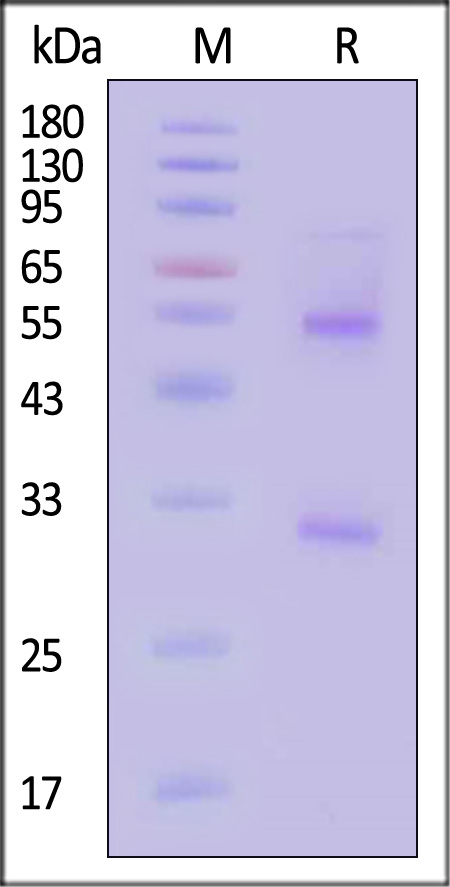分子别名(Synonym)
EDSPD2
表达区间及表达系统(Source)
Human Complement C1s Protein, His Tag (COS-H52H3) is expressed from human 293 cells (HEK293). It contains AA Glu 16 - Asp 688 (Accession # P09871).
Predicted N-terminus: Glu 16
Request for sequence
蛋白结构(Molecular Characterization)

This protein carries a polyhistidine tag at the C-terminus.
The protein has a calculated MW of 76.8 kDa. The protein migrates as 30 kDa and 53-55 kDa when calibrated against Star Ribbon Pre-stained Protein Marker under reducing (R) condition (SDS-PAGE) due to glycosylation.
内毒素(Endotoxin)
Less than 1.0 EU per μg by the LAL method.
纯度(Purity)
>90% as determined by SDS-PAGE.
制剂(Formulation)
Lyophilized from 0.22 μm filtered solution in 20 mM Tris, 150 mM NaCl, pH7.5 with trehalose as protectant.
Contact us for customized product form or formulation.
重构方法(Reconstitution)
Please see Certificate of Analysis for specific instructions.
For best performance, we strongly recommend you to follow the reconstitution protocol provided in the CoA.
存储(Storage)
For long term storage, the product should be stored at lyophilized state at -20°C or lower.
Please avoid repeated freeze-thaw cycles.
This product is stable after storage at:
- -20°C to -70°C for 12 months in lyophilized state;
- -70°C for 3 months under sterile conditions after reconstitution.
电泳(SDS-PAGE)

Human Complement C1s Protein, His Tag on SDS-PAGE under reducing (R) condition. The gel was stained with Coomassie Blue. The purity of the protein is greater than 90% (With Star Ribbon Pre-stained Protein Marker).
活性(Bioactivity)
Measured by its ability to cleave a colorimetric peptide substrate, N-carbobenzyloxy-Lys-ThioBenzyl ester (Z-Lys-SBzl), in the presence of 5,5’Dithio-bis (2-nitrobenzoic acid) (DTNB).The specific activity is >8000 pmol/min/μg (QC tested).
Protocol
背景(Background)
This gene encodes a serine protease, which is a major constituent of the human complement subcomponent C1. C1s associates with two other complement components C1r and C1q in order to yield the first component of the serum complement system. Defects in this gene are the cause of selective C1s deficiency.






















































 膜杰作
膜杰作 Star Staining
Star Staining











